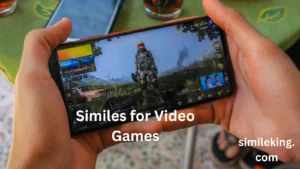Language is a versatile tool that allows us to express ourselves in countless ways.
One of the most effective methods for making communication both engaging and colorful is by using similes—figures of speech that compare one thing to another, often to highlight contrasts or nuances.
In everyday conversations, we often encounter the need to describe something as “different,” but instead of repeating this term, a wide array of alternatives can offer a more vivid or suitable expression depending on the context.
In this article, we will explore various polite, professional, and casual alternatives to the phrase “similes for different.
Whether you’re texting a friend, speaking in a formal meeting, or addressing an online audience, it’s crucial to tailor your language to the situation.
We will offer at least 12 examples of similes and their proper use in texting and conversations, helping you convey your message clearly and effectively, while also maintaining the appropriate tone.
Along the way, we’ll examine the nuances of each phrase and how to choose the best alternative based on the context.
Let’s dive into the different similes and expressions that can replace “different” in various communication settings.
1. Like Night and Day
Tone: Neutral to Polite
Context: This simile suggests a stark contrast, much like the difference between night and day. It’s appropriate for describing two things that are completely different, often with a focus on their opposite qualities.
Example:
“Her approach to problem-solving is like night and day compared to mine. She’s much more methodical.”
2. Like Apples and Oranges
Tone: Casual
Context: This is one of the most common and casual expressions used to highlight a major difference between two things, typically in the context of comparing two unlike objects or ideas.
Example:
“Trying to compare their experiences is like apples and oranges—they are so different in every way.”
3. As Different as Chalk and Cheese
Tone: Casual to Polite
Context: This simile is popular in British English and suggests two things that are very dissimilar. It’s an excellent choice for informal or friendly discussions, but it can also be used in polite settings.
Example:
“Her career and mine are as different as chalk and cheese. She works in finance, and I’m in the arts.”
4. As Far Apart as the North and South Poles
Tone: Professional
Context: This simile is often used to describe an extreme difference, especially in professional or academic settings. It’s effective when the differences are vast or extreme.
Example:
“Their views on the subject are as far apart as the North and South Poles, making collaboration nearly impossible.”
5. Like Oil and Water
Tone: Neutral to Polite
Context: This expression highlights how two things do not mix well or are fundamentally incompatible, much like oil and water. It’s commonly used to describe relationships or ideas that don’t harmonize.
Example:
“They seem to be like oil and water—no matter how hard they try, they just can’t get along.”
6. As Different as Two Sides of the Same Coin
Tone: Neutral to Professional
Context: This simile is useful when highlighting contrasting elements of a situation or concept, though they are still connected in some way. It works in both professional and informal discussions.
Example:
“Her version of the story is as different as two sides of the same coin. She emphasizes different aspects of the event than I do.”
7. As Distant as the Stars
Tone: Polite, Formal
Context: This simile is poetic and can be used to describe two things that are far apart in terms of nature, distance, or differences in understanding.
Example:
“Their understanding of the issue is as distant as the stars. There’s little common ground between them.”
8. As Alien as Mars
Tone: Casual to Professional
Context: A simile that suggests something is completely foreign or unrelatable, much like how Mars is an alien world to us. This can be used in professional discussions to describe different approaches or perspectives.
Example:
“Her strategy for marketing is as alien as Mars to my own. I would have never thought of that approach.”
9. Like Black and White
Tone: Casual
Context: This simile is used to describe things that are extremely different, often with clear, distinct boundaries or contrasts.
Example:
“The two proposals are like black and white. One is very conservative, and the other is innovative.”
10. Like Day and Night
Tone: Neutral to Polite
Context: Similar to “night and day,” this expression can emphasize drastic differences between two things, highlighting a complete change or contrast.
Example:
“The weather here is like day and night compared to my hometown—it’s much colder.”
11. Like a Fish Out of Water
Tone: Casual
Context: This expression is often used to describe someone or something that feels uncomfortable or out of place in a particular situation. It’s ideal when discussing how different something is from its usual context.
Example:
“When I first started in this new industry, I felt like a fish out of water. Everything was so different from what I was used to.”
12. As Foreign as a Foreign Language
Tone: Neutral
Context: This simile emphasizes something that is very unfamiliar or hard to understand, much like how a foreign language might seem foreign and complex.
Example:
“To me, their legal jargon is as foreign as a foreign language. It’s hard to follow all the technical terms.”
Conclusion
Choosing the right simile or alternative expression for “different” depends heavily on the context of the conversation, the audience, and the tone you wish to convey. Whether you’re engaged in a casual chat, a professional meeting, or even a formal discussion, there’s always a simile or expression that fits your needs.
By understanding the nuances of each simile, you can effectively communicate differences in a way that resonates with your audience. Remember, the key is not just to find a replacement for the word “different,” but to choose one that matches the situation and conveys the intended meaning with precision. Whether you aim for a professional tone, a polite remark, or a casual comparison, these similes will help you add variety and depth to your language.





